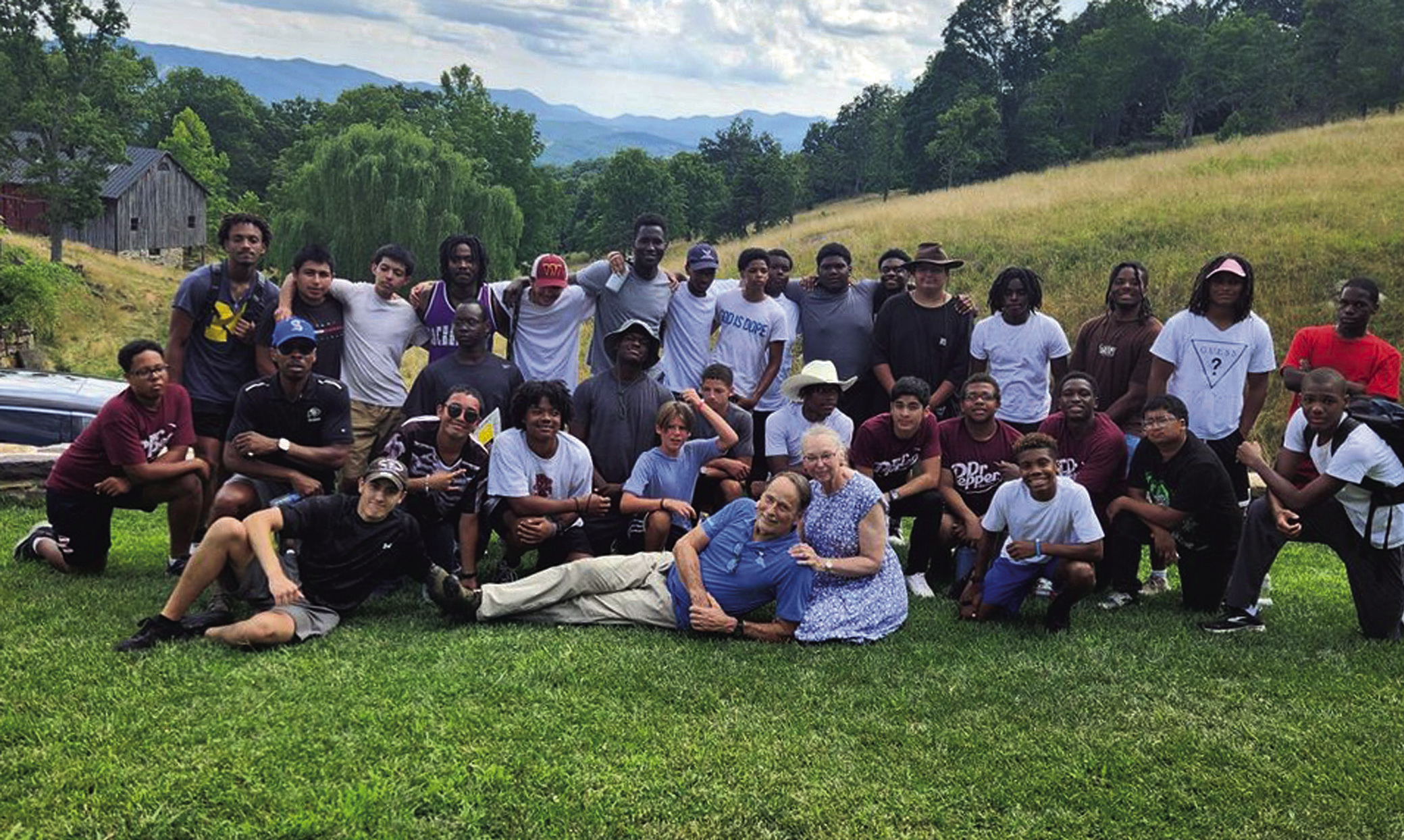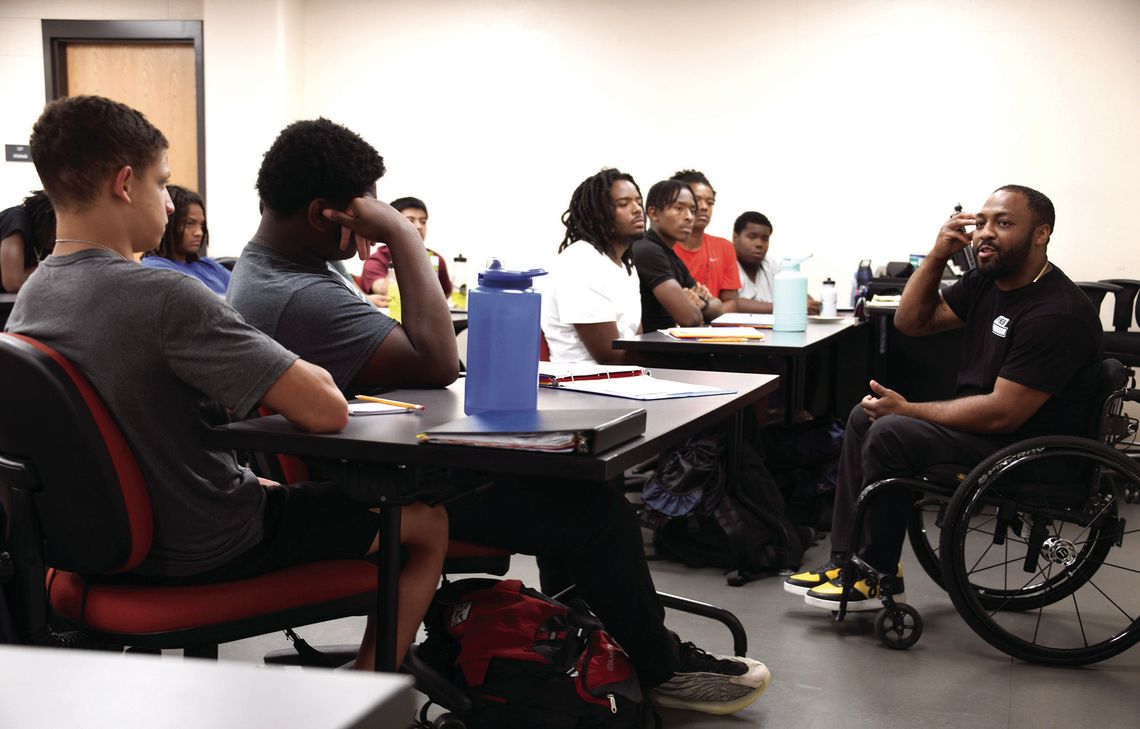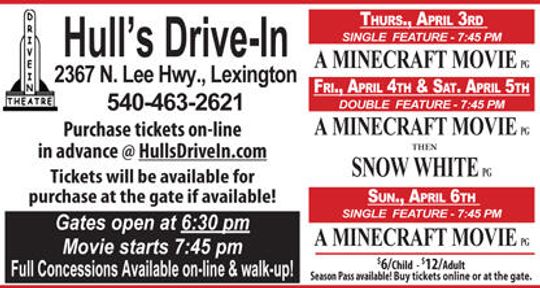Students Hear From Author, Activist Ford
The College Orientation Workshop, Inc. (COW) program returned to Virginia Military Institute this summer, marking its 38th year of transforming the lives of promising, male, minority and at-risk high school students.
This year, 29 students from eight states, and the District of Columbia, participated in the four-week program that offers education, leadership and character building, and physical training at no cost to them.
The program included intense physical training as well as classes in mathematics and English. They also learned CPR, public speaking, financial literacy, career exploration, and learning skills. The students engaged in choral music, improved their swimming skills at the Aquatic Center, faced their fears crossing the high ropes course in the Corps Physical Training Facility, performed team-building exercises, engaged in community service activities, and learned firefighting and lifesaving skills with the city of Lexington Fire and Rescue team. They also enjoyed fun activities such as kayaking down the Maury River, canoeing on the James River, camping, going on field trips to farms and museums, and picnicking.
The students heard from several guest speakers, including Leon Ford, who is an author, activist, and mental health ambassador.
In 2012, at the age of 19, Ford was shot five times by a Pittsburgh police officer as he was racially profiled during a case of mistaken identity.
Waking up in a hospital bed in intense pain, hooked up to tubes and under arrest, he was stunned to his core when the doctor entered the room and told him, “I have good news, and bad news. The good news is you’re going to survive. The bad news is you’re never going to walk again.”
Initially, Ford was extremely angry, questioned God, and did not know how to cope with his radically altered life. He sought out known national activists to assist him in fighting what he believed to be a gross injustice, but because Ford had a juvenile record, they did not respond to his requests.
Instead, he started his own social media platform in which he disparagingly criticized the police and politicians of Pittsburgh. For a time, he had over 60,000 followers on Instagram. It was his grandfather who challenged Ford’s negative attitude.
“My grandfather called and said to me, ‘Leon, I love to see you on social media, but I have one question for you. Do you want to make a point, or do you want to make a difference? How is arguing and cussing the mayor and police chief on Twitter improving the life of your son?’” Hearing his grandfather’s voice of reason inspired Ford to rethink his approach, and he enrolled in a college course that addressed police and society. Through the course, he gleaned a better understanding of the challenges police officers face, and was able to look at crime and law enforcement from their perspective.
He established a positive and productive relationship with law enforcement, and dedicated himself to bridging the gap between the police and the communities they serve.
In collaboration with the Pittsburgh police chief, Ford established the Hear Foundation, a nonprofit that funds and implements initiatives that builds relationships between police and citizens and strengthens neighborhoods.
Ford now travels the world sharing his story of resilience and forgiveness. More about Ford can be found on his website, www.leonfordspeaks. com.
COW was founded by Eugene Williams ’74, who also serves as the executive director. Early in his VMI experience, he realized that many high school aged males could benefit from the VMI style of training, even if they could not meet the requirements to become VMI cadets.
Over the life of the program, approximately 75% of participants go on to attend college. The other 25% have attended trade schools, entered the military, or worked in other civilian pursuits.
Interested students submit an application for the program that includes an essay and an agreement to “pay it forward,” meaning they will do acts of service in the future to repay the generosity shown to them through the program.
There is no charge to the students selected to the program, since in most cases, neither the participant nor his family have the resources to cover the costs. It is a fundamental tenet of the COW program, which is a 501(c)(3) nonprofit, that lack of economic resources should not prevent a deserving student from participating.
All funds to cover the costs of the program are raised by private donations, small foundation gifts, or through the annual signature fundraising event, the COW Golf Classic, at the Country Club of Virginia in Richmond. For more information, or to donate, visit the website www.cow4life.org.

STUDENTS in the College Orientation Workshop gather with Philip and Ava Clayton at their farm on House Mountain, Hawkridge Farm, for a picnic earlier this month. The students spent the day with the Claytons, who talked to them about the geological evolution of this area and some of the early people who lived here. The students even had a chance to pet some of the cattle, an experience most of them had never enjoyed. “They had a wonderful time and took away a much enriched knowledge of the mountain way of life here,” said Philip Clayton.





